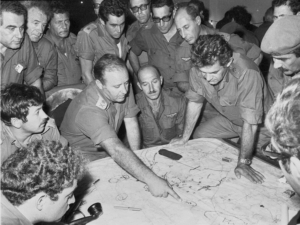Israeli Prime Minister Holds Major Meetings at the United Nations General Assembly

A view of the United Nations building from the New York skyline (Source: The Blowup/Unsplash)
It was a whirlwind week for Israeli Prime Minister Benjamin Netanyahu, who was in New York City for the United Nations General Assembly (UNGA) meetings. During his time in New York, Netanyahu met with Turkish President Tayyip Erdogan for the first time. The two countries have had strained relations for many years. However, ties have slowly been improving; this week, each leader promised to make a state visit. During their meeting, they discussed political, economic, and regional topics, including the hot topic of the Israeli-Palestinian issue.
Earlier the same day, Netanyahu was the first Israeli leader since the start of the war with Russia to meet with Ukrainian President Volodymyr Zelensky. The two, along with their delegations, had a good meeting. Netanyahu reaffirmed Israel’s commitment to sending humanitarian aid and helping remove landmines. Zelensky has repeatedly asked Israel for help with defense systems (the Iron Dome) and other technologies to help protect against drone attacks. Israel has not yet responded to this request. Israel and one other nation are the only countries in the Western world not to have made a trip to Ukraine’s capital, Kyiv, to visit President Zelensky. Israel’s Foreign Ministry continues to advise Netanyahu not to make the visit.
The next day was Netanyahu’s long-anticipated one-hour meeting with US President Biden at a nearby hotel. The two talked about normalizing ties between Saudi Arabia and Israel. The Biden administration has made it clear Israel will probably need to make some beneficial moves toward the Palestinians before any normalization can occur. Biden also cautiously warned Netanyahu to uphold “democratic values that lie at the heart of our partnership, including checks and balances in our systems.” President Biden did invite Prime Minister Netanyahu to return for a meeting at the White House sometime before the year’s end. Their meeting concluded with conversations about Iran and ensuring it never acquires a nuclear weapon.
Please keep our world leaders in prayer, as all recently met, gave speeches, and discussed critical global issues. Please pray for wisdom and guidance as they govern.
Read more about Netanyahu’s meeting with President Biden . . .
The Yom Kippur War—Fifty Years Later

Israeli chief of staff meeting during the Yom Kippur War (Source: Bamahane photographer/Wikimedia Commons)
Fifty years ago, in 1973, Israel was caught in a surprise attack by Egypt and Syria. Egyptian forces swept across the Suez Canal into the Sinai Desert and southern Israeli territory. At the same time, Syrian troops in the north invaded the Golan Heights. Ample intelligence reports indicated a military build-up, but the Israeli foreign ministry and top levels of government had not taken the threats seriously. Egypt and Syria wanted to erase the humiliation they experienced when they lost the Six-Day War in 1967, in which Israel gained control of large amounts of land in the Sinai and Golan.
The two-front surprise attack occurred on Yom Kippur, the holiest day of the year for Jewish people. While most of the country was fasting and praying, dozens of Syrian tanks invaded from the north. With phones forbidden and radios off due to the holiday, activating the military had to take place by word of mouth. As troops started to gather at their designated sites, they were heavily outnumbered and unprepared. However, Israeli troops were eventually able to push back and hold off the invaders in the north and overrun the Suez Canal in the south. There are many accounts of miracles taking place in the field, too.
Israel recaptured all the land lost to Egypt and Syria, and after nineteen days, the war ended with a United Nations-brokered ceasefire. Israel lost a high number of troops—2,600 people—with many more wounded. Now, after fifty years, the Israel State Archives released previously confidential military archives, making more than 3,500 files, including documents, videos, and transcripts, digitally accessible. Only a few sensitive intelligence reports have been redacted or remain classified. The project took two years to complete and is Israel’s most extensive disclosure of state archives ever.
Please pray: Many in Israel still fast and pray on Yom Kippur. For most, it is a day to get right with the Lord by afflicting themselves according to the Hebrew Scriptures. Even those who do not keep a religious lifestyle will spend this day introspectively and purposefully determined to be accepted by God. The roads are empty of cars and buses, and trains do not run. There is no air travel for 24 hours. Stores and businesses close. For those who do not care about religious observation, the streets are full of people on bicycles and scooters.
Please pray for each of these people: the religious, the nominally observant, and those who do not see a reason to get right with the Lord—for God to speak to them in a clear, small voice about how He has made atonement, forgiving their sins and making a way for their salvation. Jesus is our perfect, spotless Lamb who was sacrificed for the atonement of our sins!
Israel Staff Have a Conversation about the Bread of Life in an Israeli Bakery

Israeli bread (Source: Ria/Unsplash)
One of our staff recently had a meaningful conversation about Messiah’s identity.
I love surprise two-minute gospel conversations, especially those in the local Israeli flavor! I recently enjoyed one at my local bakery. As I paid, one cashier, Yaron,* whom I had never met, looked at me and said, “You are a yoga teacher, right? You look like a yoga teacher.” “No,” I answered. Nothing I was wearing could have given him the impression I was a yoga teacher.
Unconvinced, Yaron insisted, “Are you certain you are not a yoga teacher?” Smiling, I said, “I am really not.” “Well, you teach something. What do you teach?” he asked. I explained I teach Tanakh (i.e., the Old Testament) and the New Testament.
Yaron smugly responded, “I knew you taught something! But why do we need the New Testament when the Tanakh is complete and perfect?” “You are right, it is perfect,” I said, “but the Tanakh speaks of prophecies, specifically concerning Messiah— His coming and who He is—the fulfillment of which are not covered in the Tanakh, but which the New Testament reveals.”
“So, who is it?” he asked. People continued bustling about. “I believe the Messiah is Yeshua, as shown in the New Testament, and He fulfills the Messianic prophecies throughout the Tanakh.” “But if the Messiah came, should there not be peace?” Yaron noted. “Clearly, there is no world peace.” “Well, not yet,” I replied. “There are two comings of the Messiah: He first came as the Suffering Servant to die for our sins, as prophesied in Isaiah 53, but He will return a second time on the ‘Day of the Lord,’ as spoken of in the prophets, to judge the earth and bring peace.”
“We are still waiting for Messiah,” he responded. “But what if Messiah has already come?” I asked. “If we truly believe in God and His Word, should we not search and see who He is and if He has come?”
In a busy bakery, there’s just so much one can cover in two minutes. But a little poking and seed-planting is a good start.
Please pray for more such opportunities with Yaron and others and for God to bring more believers to water seeds sown!
*Name changed.



 Israel has been a divided country since its inception due to cultural and religious differences among Jewish people from various lands.
Israel has been a divided country since its inception due to cultural and religious differences among Jewish people from various lands.